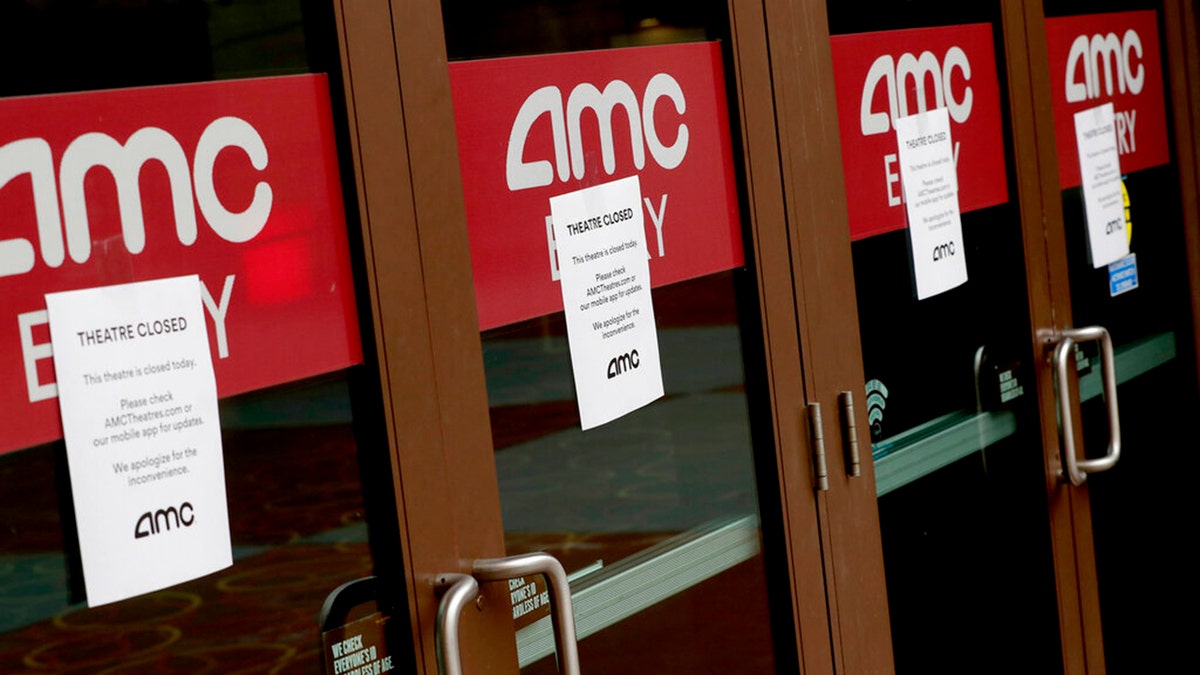Get all the latest news on coronavirus and more delivered daily to your inbox. Sign up here.
Although the coronavirus pandemic has caused thousands of people who work in the film industry to face an uncertain future, many are already looking ahead to gauge how much the business will change once production is allowed to begin again.
The COVID-19 pandemic forced countless movies in production to close up shop as guidelines on social distancing and nonessential workers remain in effect. As time goes on, it’s becoming clear that the thousands of on and off-camera workers who are desperate for their jobs to start up again won’t be returning to the kind of film sets they’re used to.
Christian Simonds, a partner at the global law firm Reed Smith’s Entertainment and Media, told Fox News that even when restrictions are lifted, it’s likely the same number of jobs won’t be returning.
CORONAVIRUS: WHAT YOU NEED TO KNOW

A movie theatre is closed Wednesday, March 18, 2020, in Phoenix due to the coronavirus. Experts say the film industry may have more trouble bounding back than previously thought. (AP Photo/Matt York)
"I think crews will be limited to essential production personnel only. I think many ancillary positions - production assistants, etc. - will no longer be allowed on set," Simonds explained. "The goal will be to minimize crew as much as possible while cast is on set."
Senior media analyst at Exhibitor Relations, Jeff Bock, echoed those sentiments, telling Fox News that the industry can expect "smaller crews" and "fewer locations" as well as "an insane increase and reliance on VFX."
"Background actors. VFX can easily replace them, but obviously that comes at a cost," Bock explained when asked who would likely be hit the hardest. "Expect a lot of crew to double as extras in the months/years to come. Every director will end up being Alfred Hitchcock as their services as extras will no doubt be utilized."
However, unions like SAG-AFTRA, which represents mostly on-camera workers, is currently being as proactive as possible to make sure that it’s prepared to mitigate the impact of COVID-19 on its members.
HOW PAST OUTBREAKS SHAPED CORONAVIRUS RESPONSE IN US
"We're working aggressively with our internal experts, with industry safety representatives and coordinating with other guilds and unions on the issue of safety," National Executive Director of SAG-AFTRA, David P. White, told Fox News in a statement. "No one yet knows when the industry will be able to return to work, but we intend to be ready at the earliest possible time while ensuring the safety of our members."

This image released by Disney/Marvel Studios' shows Scarlett Johansson in a scene from "Black Widow." Many of the Marvel Studios movies shoot in Georgia, which is rapidly becoming a test for how the film industry will reopen after the COVID-19 pandemic. (Marvel Studios/Disney via AP)
The International Alliance of Theatrical Stage Employees (IATSE), which handles mostly below-the-line workers, says it's doing the same.
"We want everyone to get back to work as soon as possible, but we need to do it right," a spokesperson for IATSE told Fox News. "Every worker in our industry deserves a safe workplace, period."
However, there is only so much planning that can happen. Until movies are allowed to go into production again, everything remains hypothetical.
"Bottom line — a safe environment as dictated by the insurance companies," Bock told Fox News when asked what needs to happen before the industry can start back up. "Until production companies can secure insurance for their movies and TV shows they simply won’t be able to ramp up production again. This new wrinkle will obviously change the parameters of the Hollywood game as guidelines are currently being shopped around."
TIPS ON TALKING CORONAVIRUS WITH YOUR KIDS
While filming in Hollywood remains virtually nonexistent, one ever-growing moviemaking hub in the U.S., Georgia, is currently ironing out the details to get its industry back to work. Thanks to Gov. Brian Kemp making the controversial decision to be among the first states to loosen lockdown restrictions, the state’s Department of Economic Development has already been hard at work figuring out what the new film landscape will look like to provide an example for the industry at large.
"The state has been working on plans for a safe return to operations across industries, including bolstering testing capabilities as we look to move forward with projects cautiously while protecting our terrific crews here," a spokesperson for the department told Fox News. "We are in constant talks with studios and production companies as they determine the best methods to ensure the safety of all cast and crew in the state. We thank the film and entertainment industry for the many ways they have stepped up to support Georgia’s fight against COVID-19 while on hiatus."
HOW CORONAVIRUS DIFFERS FROM FLU: SYMPTOMS TO WATCH FOR

'Trolls World Tour' was a massive VOD success, which many believe will threaten the theater industry after the COVID-19 pandemic. (DreamWorks Animation via AP)
While studios, guilds and unions prepare for the eventual return to work Simonds notes that the industry should be less concerned with what making movies will look like than what seeing movies will look like.
"I don’t think sets will normalize until at least 2021. The bigger question will be, ‘how will content be released/consumed (theaters v. digital/VOD)?’" Simonds said. "This will be a heated debate in coming months as production resumes but audiences remain reluctant to return to theaters."
The debate already took a drastic turn after the AMC Theater chain announced it would no longer carry movies made by Universal after comments about the very successful VOD releases of "Trolls World Tour" made by NBCUniversal CEO Jeff Shell, arguing that VOD threatens the theater distribution model that so many people rely on and enjoy.
CLICK HERE TO GET THE FOX NEWS APP
"To open movie theatres on a scale the industry is used to will take quite a long time," Bock concluded. "This isn’t just restarting the box office engine, this is rebuilding the entire exhibition industry. This is going to take time."














































